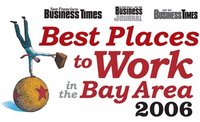
Tom Foremski
asks, "What is a viable business model for the mediasphere?" (mainstream media & blogs).
"Current media business models cannot carry the information load because they are being decimated faster than the ice caps are melting. What happens if the old media dies before the new media learns to walk..."?
Tom promises ever-lasting fame to whomever figures this out. I love a challenge. Here goe
s:The mainstream media (MSM) needs to start charging for premium content. Period. Clearly, giving away content in
hopes of generating revenues from online ads is
not working.
Ideally the MSM would gang together and make this happen universally and all-at-once.
Horrors, right? But, this would immediately put the brakes on "
parasitic" consumer-generated media (CGM), which would start to choke on its own exhaust within 30 days of such a media temblor.
The resulting surfeit of free CGM content would ultimately make consumers weary and leery of all the teeth-gnashing & opinion-mongering... They would gravitate back towards the MSM (as
discussed earlier),
predisposed to pay a premium for high quality content.
The trick is to make consumers pay DIFFERENTLY for premium content: forget about annual subscriptions or over-priced per-article charges. The answer lies in viable MICROPAYMENT and LICENSING approaches.I wouldn't mind spending $0.05 for 1-time access to an article, and, say, $2.50 to make a link to premium content on my blog available to my readers (or, to raise the bar, to readers
subscribed to my RSS feed) for a 3-month period.
Such "little nibbles" would not hurt too badly. And according to Technorati (via
Kami Huyse), only
9 percent of bloggers post with regularity; these so-called "elite" would surely have the wherewithal to pay for a fair number of links to premium MSM content ... and as it got cost-prohibitive, they might be forced to add more of their own value, and to only the most compelling MSM content (vs. simplistic blog posts like, "check this NY Times link").
Right now, about 25 MSM sites are represented on
this top 100 "blogged-about" list at URLfan. The Washington Post is at #4, with 4,693 blog links. If you multiply 4,693 by $2.50 (for the proposed 3-month license described above), that could have netted WaPo over $11K in 3 months. "Chump change," yes, but it begins to add up to a tidy supplemental revenue stream - and, it's $11K that the paper would not have seen otherwise. Also, it's
incremental and continuous:
every article link would be monetized in perpetuity... That original $2.50 payment by the blogger would lead to follow-on income of $0.05 with every click that occured among the blog's readers, after the initial 3-month period wore out. Ultimately it's a similar model used in radio, e.g., the artist gets a few pennies for every time their song is played.
The keys to a successful "MSM Micropayments" approach?- Rational "fair use" policies - including options for "pay-per-view," "unlimited views (per IP address or subscriber log-in)" and, most importantly to the blogosphere - simple-to-administer "time-limit licenses" ("this content available to your blog readers for 1-month; after that they pay $0.05 to view the link")
- Reasonable pricing - $0.05 is better than $0.25 for a one-time view of the content
- One-click ordering (Google toolbar/wallet) - ideally, content-based payments would show up in an aggregated way on our credit card statements
- Revamped micropayment policies/standards/fees from credit card companies & PayPal
- Technology and/or agreements that block search engines from accessing/archiving premium content without compensating content creators
- Universal Digital Rights Management adoption (Adobe/PDF) to hinder content piracy
None of which would be EASY to figure out. But it beats going outta business!
 Charlie (pictured) is getting bigger and bigger. He must be tipping the scales at 120lbs. by now, with no end in sight. That's great: we love big dogs; the bigger the better.
Charlie (pictured) is getting bigger and bigger. He must be tipping the scales at 120lbs. by now, with no end in sight. That's great: we love big dogs; the bigger the better.





























